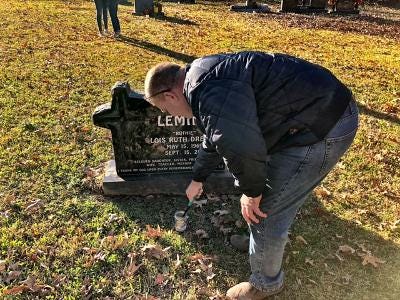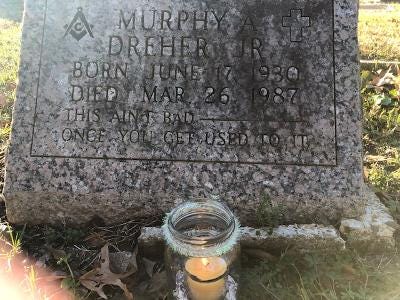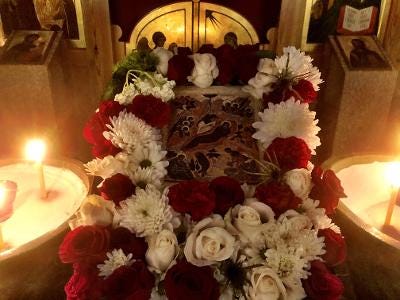I think this might be one of the loveliest photos I’ve ever seen of my mom. Those eyes, so kind and welcoming. I took it today as we were at the Starhill Cemetery laying out candles in glass jars on every grave there. It’s a tradition my mom and my late sister Ruthie started over two decades ago. This was only the second year my mom was unable to participate herself. She said it was too cold for her to get out of her car, so she watched as my family, Mike Leming and his daughter Rebekah, and some Starhill neighbors put the candles on the graves, and lit them.
Nine years ago, in The New York Times, David Brooks wrote about this tradition. In 2011, three months after Ruthie’s untimely passing from cancer, Julie and I and the kids had moved to St. Francisville from Philly only a couple of days before Christmas. We were too overwhelmed unpacking boxes and cooking Christmas dinner for my folks and all the family to pay attention to the candles. It looked as if the tradition would be broken. Brooks wrote:
For the past many years, Ruthie and her mother had a tradition of going to a nearby cemetery on Christmas Eve to put candles on all the graves. This year, with Ruthie in that cemetery, her mother was too sad to do it. But, as she was driving by the cemetery that night, she noticed little flames dotting the graveyard.
She called Dreher, sobbing. “You’ve got to find out who did this for us. ... Whoever it is, they will never know what this meant to me. They will never, ever know.”
It turns out that it was a neighbor named Susan Harvey Wymore, who had learned that Ruthie’s mother would be unable to light the cemetery and did it for her.
David’s column got me a book deal to write what became The Little Way Of Ruthie Leming. I interviewed Susan Harvey Wymore about why she had taken the initiative to carry the tradition on that bleak Christmas for my mom. She told me:
I’m glad I could do something for your Mama, but it meant a lot to me too. I get choked up about this stuff. Your Mom would do different things for the cemetery. My twins are buried there. The first year you Mom and Ruthie did this, they put out little crosses made out of antique nails. They put two crosses there for the twins, one for each one of them, even though they share a grave. The twins were stillborn, and a lot of people don’t know how to act around that. They don’t know whether to say something or not. But your Mama and Ruthie they put two crosses there. To me, that acknowledged that the twins were people. I never forgot what your mom did for me. ... They've been dead 21 years, but you never know when you're going to wake up one morning and it feels like just yesterday.
This year, 2020, two of Ruthie’s girls weren’t there. Hannah was home last weekend for her sister Claire’s wedding, and having passed a Covid test, flew back to Barcelona. Claire and her husband Kiké are in Natchitoches. Mike and his and Ruthie’s youngest, Rebekah, were there today. Here’s Mike lighting the candle at Ruthie’s grave:
Nine Christmases without Ruthie. Hard to believe. I lit the candle on my Uncle Murphy’s grave.
If you look closely, you can read the epitaph: THIS AIN’T BAD — ONCE YOU GET USED TO IT.
I’ve told the story a hundred times here about how he won this tombstone in a card game. A tombstone maker who owed Murphy a gambling debt offered to pay it off by carving Murphy’s tombstone. Murphy wrote his preferred epitaph on a napkin, and gave it to him. When the thing was ready, Murphy sent his teenage sons to pick it up. He had a big party — he wanted to attend his own wake — at which Gov. Jimmie Davis, the writer and performer of “You Are My Sunshine,” played with his band. Then Murphy had his tombstone installed outside his front door. I remember many Christmas Eves as a kid, going to a big party at Uncle Murphy and Aunt Patsy’s place, walking past that tombstone.
Murphy and Patsy were friends with an interesting cat named Jules d’Hemecourt. Jules recorded a version of The Cajun Night Before Christmas, which you could hear on south Louisiana radio stations back in the Seventies (if you’re from south Louisiana, and are of a certain age, click on that recording, and your childhood will suddenly return). One year, Jules was at the Christmas Eve party, and sat in front of the roaring fire telling the story to us kids, in his Tee-Jules character (“Tee” is Cajun slang for “little,” from “petit”). Magic, it was. When I think of those Christmas parties, I hear the tinkling of ice in cocktail glasses, the smell of bourbon, and happy murmur of a kitchen full of people talking, Patsy’s mammoth tree, with presents piled high like foothills, and the tingly feeling of knowing that when I woke up the next morning, Santa will have come. The world was enchanted then. They’re almost all gone now, the people who made it happen. My mom is the only one left of that generation.
This year, because of Covid, we couldn’t have the annual Dreher family Christmas party, which now happens at Cousin Andy and Cousin Nancy’s place in Starhill. “Next year, we’re going to do it twice as hard,” Nancy said. Man, I hope so. I love that party so much, seeing all the cousins. Next year. Next year. Say it like a vow. Say it like a prayer.
Mama called tonight to say, “My phone has been ringing off the hook with people calling to say how beautiful the cemetery looks tonight.” She was ebullient. It has become a tradition for people in West Feliciana Parish to drive out to the country and see the field of stars glowing on the graves after night falls on Christmas Eve. Mama told me that the idea for putting candles on all the graves — over two hundred — came from Ruthie. They had been doing this on the graves of our ancestors buried there, but Ruthie thought it would be nice to do it for everyone.
“She told me that candles in the cemetery was like life,” my mother said tonight. “You light them in the daylight, and it’s nothing special, but after it gets dark, all those little points of light take your breath away.” It’s true.
Christmas Songs
I’ve never met him in person, but my friend Terry Teachout is one of my favorite people. He’s the drama critic of the Wall Street Journal, and, from what I know of him through his writing, one of the most big-hearted people in journalism (if that’s not damning with faint praise). Terry has had a bad year. He lost his wife Hilary, known to his Twitter followers as the beloved Mrs. T., to chronic lung disease early in the new year. He writes today on his blog about how blue he is this Christmas. Excerpt:
At my age, of course, you have no choice but to accept the increasingly obtrusive presence of death in your life. The fact that it has come so often around Christmastime, though, is a thing I find hard to tolerate. Something had to give, and what gave was my ability to celebrate Christmas. It’s not entirely gone: I still love A Christmas Carol, Meet Me in St. Louis, and all the wonderful seasonal songs. But there is no tree in my home, nor is my heart light, and both of these things were true last year as well.
I suspect that’s why my favorite Christmas song is “Have Yourself a Merry Little Christmas,” which speaks forthrightly of the sadness that so many people feel at this time of year, perhaps never more so than in 2020:
Someday soon we all will be together
If the fates allow
Until then, we’ll have to muddle through somehow.As it happens, I’m muddling through surprisingly well—I feel much better than I did a couple of months ago—but I know the next couple of months will inevitably be full of sadness. So if you incline the same way, try to keep on muddling the best way you know how, and hold in your bruised heart the second line of “Have Yourself a Merry Little Christmas”: Next year all our troubles will be out of sight.
May it be so, and may love get us all from here to there in one piece.
Amen and amen. Surely we are all at least a little blue this Christmas, after such a heavy year, and having to abandon our traditions for the sake of saving lives. After driving back into Baton Rouge from the country, we went to the vigil of Nativity at our Orthodox parish, and the matins for the feast. This was the first time we had been able to do this, as we are usually at the family party. It was a nice compensation, but it was difficult for me to focus on the prayers for thinking about all the people I know who are hurting tonight. One friend in particular is in a very painful situation; I stood in the back of the church and prayed for him, and wished I could do more.
But oh, these Orthodox prayers! Here’s a sample of what we heard chanted tonight at vespers:
Make merry, O heaven and earth, as the Prophets foretold!
Celebrate in the spirit, O Angels and men!
God is born from a woman and appears in the flesh
to those who sit in darkness and shadow.
A cave and a manger welcome Him.
Shepherds announce the wonder.
Wise men from the East offer gifts in Bethlehem.
Let us from our unworthy lips offer praise like the Angels:
“Glory to God in the highest, and on earth peace!”
The Expectation of the Nations has come.
He has come and saved us from bondage to the Enemy.
Today heaven and earth are united, for Christ is born.
Today God has come to earth, and man ascends to heaven.
Today God, Who by nature cannot be seen,
is seen in the flesh for our sake.
Let us glorify Him, crying:
“Glory to God in the highest, and on earth peace!
Your coming has brought peace to us.
Glory to You, O our Savior!”
“Glory to God in the highest,”
I hear the Angels sing today in Bethlehem.
Glory to Him Whose good pleasure it was
that peace should come upon earth.
The Virgin is now more spacious than the heavens.
Light has shone on those in darkness,
It has exalted the lowly, who sing like the Angels:
Glory to God in the highest!
Man was created in God’s image and likeness,
but when Jesus saw him fallen through transgression,
He bowed the heavens and came down, dwelling in a Virgin’s womb,
without forsaking His divinity.
Adam, once corrupted, was refashioned.
He cried out: “Glory to Your appearing,
O my Redeemer and my God!”
And here are some prayers we heard at matins (the service that followed vespers):
Heaven brought the first-fruits of the Gentiles as a gift for You;
a star summoned the Wise Men to the babe in the manger.
They were amazed to see neither throne nor scepter, but only abject poverty.
What is more humble than a cave?
What is more lowly than swaddling clothes?
Yet the riches of Your Divinity shone through all these.
O Lord, glory to You!
This one really moved my heart:
Bethlehem has opened Eden. Come, let us see!
We have found joy in a secret place.
Come, let us seize Paradise hidden in the cave!
There the unwatered Root has appeared,
blossoming with forgiveness.
There is found the undug Well,
from which David longed to drink of old.
There the Virgin has borne a child,
quenching Adam’s and David’s thirst.
Let us hurry to this place,
where the eternal God was born as a little Child!
“Come, let us seize Paradise hidden in the cave!” What a remarkable line. Think of the Eternal God, entering into Time as a tiny baby in a cave in a Judean town. I have been to Bethlehem, to the Church of the Nativity, and to the cave where tradition says the Messiah was born. It has been for many centuries part of the church, which was originally constructed in the fourth century, at the command of Constantine. Here is what the cave looks like today:
We know that when Constantine’s mother, Helena, made her famous pilgrimage to the Holy Land in the year 324, the local bishop took her to the site where Christians worshipped at the cave where they believed Christ was born. As this writer points out in National Geographic, Helena didn’t invent this story; she was taught it by local people in Bethlehem. She ordered a church to be built over the site. That church was destroyed two centuries later, but a new one was built; the cave was undisturbed.
Near the end of the service tonight, each parishioner stood in front of the priest as he dipped a brush into oil of chrism, painted a simple cross on our foreheads, and said, “Christ is born!” (The proper answer: “Glorify him!”). Back in my spot at the rear of the church, I kept thinking about seizing Paradise hidden in the cave. Only a handful of people in all the world — the Wise Men, and the shepherds who had been greeted by the Angel — knew that there was something great and glorious hidden in a cleft in the rock: God himself, in the form of a newborn child.
That is happening around us all now, is it not? Paradise is hidden in caves, where we would least think to look for it. Wise men know where to find it, though, this joy in a secret place. Joy that is meant for us to take.
To seize Paradise — think of it! How impossible it seems to many of us tonight, after the year we have had. Keep watching faithfully; we will have our chance. Follow the wise men, and men with the humility of shepherds. Bethlehem opened Eden on this night over two millennia ago, and it has never yet been closed to any who seek refuge there.
Merry Christmas, beloved. I’m going to sleep and, hope to dream of a field of stars.
(For an explanation of the symbolism in the Orthodox Nativity icon, see here.)







